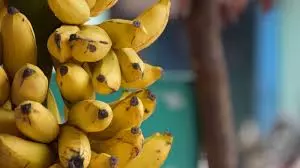How Climate Change is Impacting the Banana
Christian Aid refers to the rich for heavily polluting countries where these plantations are situated, it asks for an urgent need to phase out fossil fuels and meet their goals to make policies against climate change.

The ongoing climate crisis poses a significant threat to the future of the world's most beloved fruit—bananas. According to recent research, nearly two-thirds of banana cultivation areas in Latin America and the Caribbean may become unsuitable for farming by 2080. Extreme weather, rising temperatures, and climate-related pests severely impact banana-growing countries like Guatemala, Costa Rica, and Colombia. This situation has reduced yields and devastated rural communities throughout the region, as highlighted in Christian Aid's latest report, “Going Bananas: How Climate Change Threatens the World’s Favourite Fruit.”
Bananas are the most consumed fruit in the world and the fourth most important agricultural crop after wheat, rice, and corn. Around 80% of the bananas produced globally are consumed within their local markets, with over 400 million people relying on them for 15-27% of their daily caloric intake. The majority of banana exports are found in supermarkets worldwide, approximately 80% ofwhich originate from Latin America and the Caribbean.
This region, however, faces significant risks from extreme weather events and gradual climate-related disasters. The banana crop is now threatened by the human-induced climate crisis, putting at risk a crucial food source and the livelihoods of communities that have contributed minimally to the greenhouse gas emissions driving global warming.
Bananas are sensitive fruits and require a temperature range of 15°C to 35°C and sufficient but not excessive amounts of water. They are vulnerable to storms, which can damage the plant's leaves, reducing its photosynthesis ability.
Although there are a lot of varieties of bananas, Cavendish is popular because of its good taste, hardiness and high yield, making it the main export variety. However, the lack of genetic diversity makes it vulnerable to climate change. It contributes to the spread of fungal diseases already destroying livelihoods and crops. For example, the "black spot" fungus can reduce the ability of bananas to photosynthesise by 80% and thrives in humid climates, making bananas susceptible to erratic rainfall and flooding. These changing temperatures are causing devastating effects on the Cavendish plantations worldwide.
Christian Aid refers to the rich for heavily polluting countries where these plantations are situated, it asks for an urgent need to phase out fossil fuels and meet their goals to make policies against climate change.
The article is authored by Nikhila Gayatri Kalla, a student of Christ University, Bengaluru interning with Deccan Chronicle.

